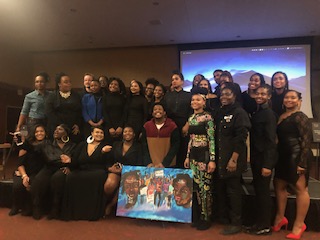Last Thursday, three Black students sat on their knees near the entrance of the symphony room in Gordon Commons with their hands behind their heads as if they were being arrested. While guests trickled into the annual Black History Month Kickoff, a girl dressed as a music conductor led the three students in song.
The impromptu performance took the surprised audience on a journey through a “Celebrity Slave Ship,” where drums aren’t allowed and chains are to be worn at all times. The tantalizing combination of movement, song, and poetry set the stage for the annual Black O’ Clock event which opened up the 2019 Black History Month at the University of Wisconsin-Madison.
“It just a showcase of us being used as puppets to tell our stories on stage because our stories are so entertaining for white people to hear,” student performer Jasmine Kiah said about the opening act which also included students Simon Guma, Solomon Roller and Brette Oplin “That was really the inspiration behind it.”
This year’s month-long celebration will pay homage to the Black Student Strike of 1969. The 50th anniversary of the notable strike commemorates the Black students at UW-Madison who fought for their concerns to be heard by the university. The Black History Month Planning Committee formally welcomed the space by exciting a land acknowledgment that recognizes the university as native land reading off the 13 demands of the 1969 Black student strike.
“In 1969 Black students held a strike and demanded that their demands be met,” said committee member Trinity Cross adding that these efforts allowed for students today to have a Multicultural Student Center and Afro-American Studies department.
Featured poet Nikki Wallschlaeger performed selections such as “Middle Passage Messaging” to open up for the Black History Month poet Danez Smith of the Dark Noise Poetry Collective.
“I’m home… I’m comfortable,” said Smith, a UW-Madison alum and award-winning poet, before asking the audience to save them a plate after the performance.
“I also get loud around chicken,” Smith said with a laugh after asking the audience to quiet down. When someone in the audience jokingly responded “you can’t be saying that,” Smith said “If we can’t embrace our stereotypes this Black History Month what can we do?”
The Poetry Foundation and McKnight Foundation poet read a variety of poems about liberation, the N-word, community and the nuances of Black culture. They took a moment in between poems to sing City Girls, yelling “Periodt!” in unison with the audience and reminiscing about their time on campus as a Black student.
“College for Black students especially at a PWI (predominantly white institution) can be a hella volatile thing and I think it’s important to remember that of the stresses that you experience here are not only temporary but amplified,” Smith said.
“Looking at the demands as a part of the presentation, you see that they were setting seeds that will benefit folks for years I think maybe that’s the lesson that we can take,” Smith said.

In addition to the performances, artist Adjua Nsoroma live-painted on canvas while visiting artist Boxx live painted on the body of Black History Month committee member Nalah McWhorter.
“We been kicking it,” Smith said. “On a serious note: ecological disasters are upon us…the time is now,’ urging the audience to seize the moment given the world’s current climate.
This year’s Black O’Clock event sparked conversation, rekindled friends and offered a space for students to be inspired.
“This semester I wanted to challenge myself to be more involved so when I found out about this event I was really excited to come and be apart of what it was,” said UW freshman Kayana Adams.
“Not only as Black students but as Black people we have always been invested in thinking about the changes that we can implement that will affect folks for generations to come,” Smith said. I think that’s a good thing to remember.
“I thought all of the [performances] were really unique and fun. They inspired me to write something and challenged me to present work [I’ve] created,” Adams said.
“For students who go to Madison or alumni of Madison, [know] that everything we demand is not for our own comfort or selfishness but for people that are going to come that we don’t even know yet.”
The 13 demands of the 1969 Strike were:
- Autonomous Black Studies Department controlled and organized by Black students and faculty, which would enable students to receive a B.A. in Black Studies.
- A Black chairman of the Black Studies Department, who would be approved by a committee of Black students and faculty.
- That at least 500 Black students be admitted to U.W. for the semester of September 1969.
- That 20 teachers be allocated for the initiation of the Black Studies department with the approval of Black students.
- That amnesty (defined as no reprisal or chastisement) be given [to] all students who participate in boycotts or other such actions in reference to our demands.
- That a Black co-director of the Student Financial Aids Office be and appointed with the approval of Black students.
- That Black counselors be hired by the Student Financial Aids Office with the approval of Black Students.
- That scholarships be provided for all athletes up until the time that they receive their degree.
- That existing Black courses be transformed into the Black Studies Department.
- That it be established that Black students have the power to hire and fire administrators and teachers who are involved in anything related to Black students.
- That it be established that control of the Black Cultural Center be in the hands of Black students.
- That all expelled Oshkosh students who wish to attend U.W. be admitted immediately.
- That proof (as defined by Black students) that the above demands have been met be given to Black students by the administration.




























